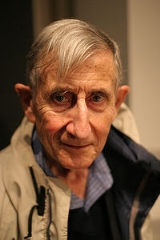
and mathematician
, famous for his work in quantum field theory
, solid-state physics
, astronomy
and nuclear engineering
. Dyson is a member of the Board of Sponsors of the Bulletin of the Atomic Scientists
. Dyson has lived in Princeton, New Jersey
, for over fifty years.
Dyson's father was the English composer Sir George Dyson
;
his mother was trained as a lawyer but after Dyson was born worked as a social worker. Despite sharing a last name, he is not related to the early 20th century astronomer Frank Watson Dyson
, but as a small boy Freeman Dyson was aware of Frank Watson Dyson.
I am acutely aware of the fact that the marriage between mathematics and physics, which was so enormously fruitful in past centuries, has recently ended in divorce.![]()
The more I examine the universe and the details of its architecture, the more evidence I find that the universe in some sense must have known we were coming.![]()
The bottom line for mathematicians is that the architecture has to be right. In all the mathematics that I did, the essential point was to find the right architecture. It's like building a bridge. Once the main lines of the structure are right, then the details miraculously fit. The problem is the overall design.![]()
The progress of science requires the growth of understanding in both directions, downward from the whole to the parts and upward from the parts to the whole. A reductionist philosophy, arbitrarily proclaiming that the growth of understanding must go only in one direction, makes no scientific sense. Indeed, dogmatic philosophical beliefs of any kind have no place in science.![]()
The laws of nature are constructed in such a way as to make the universe as interesting as possible.![]()
There is a great satisfaction in building good tools for other people to use.
![]()

